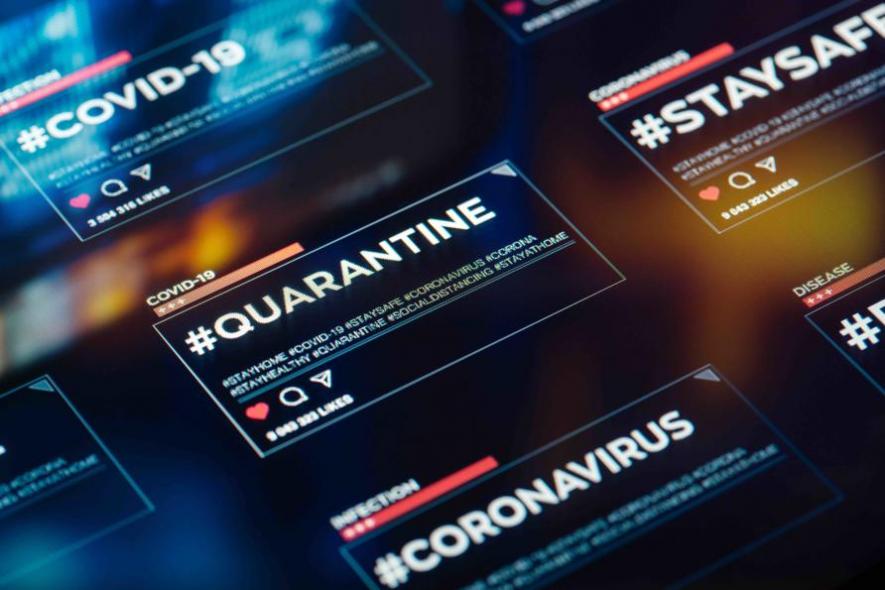Mainstream Myths Versus Scientific Collaboration

Nothing in life is to be feared, it is only to be understood. Now is the time to understand more, so that we may fear less. Marie Curie.
Does the 5G network have any link to the novel coronavirus outbreak?"
Well, any sane person on this part of Earth would readily laugh at this outrageous claim. But this claim has “gone mainstream” leading even to bomb attacks on phone masts. So one has to sit up and analyse.
No doubt, when “psychological states peak and people’s anxiety levels are high,” as one expert puts it, one can easily become prey to such conspiracy theories. And as right-wing or conservative ideas have growing legitimacy in society, things can get even worse. Remember how for a long time Iran’s theocracy was in denial about the Coronavirus threat?
India is no exception to such false claims. All sorts of home remedies are being offered as a definite cure to the disease. We saw Gomutra parties where cow urine was drunk, supposedly as protection from this highly-contagious disease which has taken more than 100,000 lives and infected more than 1.7 million. No doubt it is an arduous task for progressives to counter all the rubbish being peddled around the pandemic and prepare people to take proper care while pressurising the powers-that-be to make public health a priority.
Such struggles can be better fought if individual scientists or groups of scientists join hands to sensitise and educate people.
The recent launch of a pan-institutional CovidGyan website which is a brainchild of the Tata Institute of Fundamental Research (TIFR), the Indian Institute of Science (IISc), and the Tata Memorial Centre (TMC) is a welcome step in this direction. Other key members of this initiative include Vigyan Prasar, IndiaBioscience, and the Bangalore Life Science Cluster (BLiSC, which comprises InStem and C-CAMP, in addition to NCBS-TIFR).
What is the key concern behind this multi-institutional, multi-lingual science communication initiative?
Basically it wants to address the challenge of filtering out misinformation and comprehend reliable information from “the torrent of information generated and spread from all corners of the world” around Covid 19 which “has created information overload”. Its target audience is the citizenry as a whole and the scientifically curious among them.
Noted string theorist and recipient of the Shanti Swarup Bhatnagar Award for outstanding research, Rajesh Gopakumar, who is the director of the International Centre for Theoretical Sciences (ICTS) in Bangalore is coordinating this effort. According to him, the mandate of CovidGyan is to, “create, curate and communicate scientifically credible and authentic Covid-19 related content and resources”.
This website has informative videos, posters, articles, myth-busters etc in multiple Indian languages. In an ambience where there is every possibility that mumbo jumbo can spread, this website makes it explicit that there is no evidence that home remedies work for Covid-19.
A scientist has a dual role during any such crisis: one, to search for vaccines or cures, and two, to provide inputs informed by science which can then feed into policy measures.
Scientists also can study current circumstances and predict conditions that could follow, which can warn people and governments in advance. In a recent write-up in The Guardian, Richard Horton, a doctor who edits the prestigious science and medicine journal, The Lancet tells us how we “knew this was coming.” In her 1994 warning to the world, The Coming Plague, Laurie Garrett, a science journalist, said, “While the human race battles itself, fighting over ever more crowded turf and scarcer resources, the advantage moves to the microbes’ court. They are our predators and they will be victorious if we, Homo sapiens, do not learn how to live in a rational global village that affords the microbes few opportunities.”
Horton had also shared another analysis from the US Institute of Medicine in 2004” based on the lessons from the 2003 SARS outbreak. “Knowing is not enough; we must apply. Willing is not enough; we must do,” he said, and concluded that “the rapid containment of SARS is a success in public health, but also a warning… If SARS reoccurs… health systems worldwide will be put under extreme pressure… Continued vigilance is vital.”
As we know too well, this and other articles contain warnings that we have yet again ignored. The emphasis, instead, was on austerity, and it proved grossly counterproductive. When time came to protect their own people, the political objectives that diminished the size and role of the state led us to a situation where we are terribly unprepared, Horton said.
Today a world trying to cope with this pandemic finds itself in a blind alley again. Neither the corporate sectors nor the ruling elites in leading countries are ready to leave their greed for profit aside. At this moment of global crisis US president Donald Trump sought to buy up the exclusive rights to a promising Covid-19 vaccine from a German biotech firm.
The world’s scientists, by contrast, responded with a “collective eye roll”, and debunked the “My Nation, Your Nation” logic. They made it clear to the world that “science unites”. Reports from different laboratories show that more than 200 clinical trials have been launched, bringing together hospitals and laboratories around the globe. So the doctors are, at least, practising what they preach.
This is an emerging scientific internationalism and it has three key aspects: scientists shattering national borders while political leaders rush to lock them. Scientists talk of global collaboration on a scale unknown in the past, with more experts that ever concentrating on finding a cure to just one disease. Three, setting aside their usual imperatives such as academic credit, they are even sharing immediate and tentative results of their efforts on online repositories for scholars everywhere to study them.
“One small measure of openness can be found on the servers of medRxiv and bioRxiv, two online archives that share academic research before it has been reviewed and published in journals. The archives have been deluged with coronavirus research from across the globe.”
No doubt, in this era when “nationalistic trends across the world threaten the cross-border cooperation that underlies scientific progress”, this rediscovery of scientific internationalism is a welcome development.
It is also a reminder that without it, major scientific breakthroughs—“the discovery of the Higgs boson at CERN, the LIGO observations of black hole and neutron star mergers and the Event Horizon Telescope collaboration’s recent imaging of a supermassive black hole at the core of the M87 galaxy would have been impossible” in the later half of the 20th century. There will be no going back from these collaborations. The day when we will have a vaccine to the pandemic is sure to dawn.
The author is an independent journalist. The views are personal.
Get the latest reports & analysis with people's perspective on Protests, movements & deep analytical videos, discussions of the current affairs in your Telegram app. Subscribe to NewsClick's Telegram channel & get Real-Time updates on stories, as they get published on our website.























